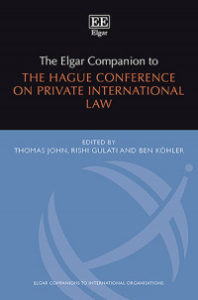This entry is the second of two parts that provide an introduction to the Elgar Companion to the Hague Conference on Private International Law (HCCH). It outlines the editors’ reflections on the 35 Chapters, drawing out some of the key themes that emerged from the Companion, including the HCCH’s contribution to access to justice and multilateralism. Together, Parts I and II offer readers an overview of the structure of the Companion (Part I, published on Conflict-of Laws on 8 December 2o2o) as well as of the core themes as they emerged from the 35 Chapters (Part II).
 Both parts are based on, and draw from, the Editors’ Introduction to the Elgar Companion to the HCCH, which Elgar kindly permitted.
Both parts are based on, and draw from, the Editors’ Introduction to the Elgar Companion to the HCCH, which Elgar kindly permitted.
General reflections
The contributions in the Companion chronicle the evolution of the HCCH in the last 127 years and provide a deep insight into the operation and workings of the Organisation. In addition, they critically assess the past and current work of the HCCH, as well as providing impetus for possible future directions. The editors Thomas John, Rishi Gulati and Ben Koehler encouraged the authors to use the Companion as a platform for critical reflections and assessments – their familiarity with the HCCH, the Organisation’s work, but also its mandate and capacity, ensures the great value of each individual contribution.
The Companion can be of much interest in three particular ways.
First, it is an academic contribution that provides considered expositions on current and future legal issues in private international law in general. The selection of authors, which are drawn from different regions and legal backgrounds, allowed considering topics from a number of different perspectives. The quality of the contributions will result in the Companion serving a most useful source in the substantive development of private international law. It also will constitute a useful resource for States, judges, legal practitioners, academics, and other public and private international organisations engaged in advancing private international law, not only in terms of gaining an understanding of existing HCCH instruments, but also in their efforts towards legislative and policy reform.
Second, the Companion aims to provide considerable and thorough insight into the workings of the organisation itself, and thus serve well as a comprehensive practical guide to the HCCH. This will appeal to those who wish to gain a better understanding of the HCCH as an Organisation regardless of their familiarity with it. It may also benefit those who have been working with the Organisation for some time and wish to broaden or deepen their understanding further.
Finally, in addition to highlighting the successes of the HCCH, the aim has also been to critically analyse the organisation and its work. Much work has been done by the HCCH, but more is required, and the 35 Chapters reveal four underlying themes.
Theme I: Private international law and access to justice
The first underlying theme that can be observed throughout all contributions is how access to justice values increasingly underpin private international law. Just some examples include the call for enhanced access to documents in multiple languages; better use of technology to improve legal cooperation across borders; the need to enhance access to justice for consumers and international tourists; the impact of the right to a fair trial on access to justice for the employees of international organisations such as the HCCH; the bearing of fair trial rights on civil jurisdiction, such as through the doctrine of forum non conveniens; and ensuring access to justice for vulnerable sections of society.
In all those instances, access to justice is an important value, and in its various manifestations, starts to underpin and shape the development of private international law. This is a positive development. Private international law ought to be more than mere technical rules but should be driven by underlying tangible values that have great practical importance. Access to justice is a laudable tangible value, recognised in Sustainable Development Goal 16 of the UN. Private international law, and in particular the HCCH, could play a significant role in providing and strengthening access to justice at an international level. And there is some indication that the Organisation appreciates that it indeed can play this role, hinting at it in its most recent HCCH Strategic Plan 2019 – 2020. However, its appreciation is limited and mentioned only in the context of the HCCH’s non-normative work.[1] Based on the discussions in the Companion, it seems that the HCCH could – and should – pursue a comprehensive access to justice agenda across its entire normative and non-normative work programme with much more vigour than is currently the case.
Theme II: the interaction between public and private international law
Another theme underpinning the Companion’s contributions is the increased interaction between public and private international law. This theme is discernible in many Chapters, including in those that deal with civil jurisdiction. It transpires that this area is one where public and private international law can especially inform each other. While this interaction is now subject to increased academic scrutiny, the same does not seem to be the case in practice. Thus, it seems important, that the HCCH pays more attention to public international law developments when pursuing its projects, especially in the sphere of the further work on the Judgments Project. Equally, such increased attention to the public realm could mean that the public realm is likely to return the favour, which is equally needed.
Moreover, the interaction between HCCH instruments and human rights treaties, such as the UNCRC and UNCRPD, was evident. With many HCCH international family law instruments concerned with child protection and the protection of other vulnerable persons, this interaction is hardly surprising. But clear interrelationships exist in other spheres as well. For example, modern work environments, which are radically shifting through remote work technology and flexible workplace, the HCCH could also work towards greater cooperation with other international organisations, such as the ILO, to assist in developing international labour standards that better protect the rights of weaker parties, including the rules on civil jurisdiction in employment cases.
Theme III: Hard and soft law instruments
A third theme that emerged was the HCCH’s willingness to adopt soft law instruments as opposed to only facilitate the negotiation of binding international agreements or HCCH Conventions. There is no better example of this than the adoption of the 2015 Choice of Law Principles, which promote party autonomy.
With party autonomy perhaps now constituting a recognised connecting factor in private international law, as is also evident with the adoption of the 2005 Choice of Court Convention underpinned by this same connecting factor, the HCCH has no doubt made an important stride to embrace the potential of soft law instruments to achieve international consensus. Following the adoption of the 2019 Judgments Convention, which was decades in the making, and only successfully negotiated after the failures of the past were recognised, rectified, and compromises made, perhaps soft law instruments could be pursued with greater energy by the HCCH. Ultimately, it will be the experience of the 2015 Choice of Law Principles that will dictate whether more soft law instruments are negotiated under the umbrella of the HCCH.
Theme IV: multilateralism
A fourth theme that emerged is perhaps more subtle: multilateralism. The Companion recalls that the founder of the HCCH, T M C Asser, conceived the first Conference in 1893 not only as a platform which develops unified rules of private international law, but also as a forum in which experts come together and develop these rules in a peaceful and professional setting. This goal has not changed, and multilateral expertise is combined to forge innovative legal solutions to the vexed challenges of a globalized world. And these solutions are adopted by consensus, the decision-making technique which lies at the very heart of the HCCH.
When dealing with the Organisation, it is important to appreciate that it decides on every aspect of its work programme and budget by reaching to the furthest extent possible consensus among its Members.[2] This consensus-based approach has been chosen not without reason. While much effort may be exerted to achieve consensus, and achieving it may take longer, consensus-based decision making ensures the maximum buy-in of the Members in the outcomes produced by the HCCH. This buy-in becomes very clear in the Organisation’s premier decision-making bodies, the Diplomatic Sessions, which adopt the HCCH’s multilateral Conventions; the Council on General Affairs and Policy (CGAP), the “engine room” which determines the Organisation’s annual work programme; and the Council of Diplomatic Representative (CDR), which takes important financial and budgetary decisions. A common saying in all bodies, but also in Working and Experts’ Groups, is: nothing is agreed, until everything is agreed; and everything is agreed by consensus.[3]
This consensus-based approach to the multilateral work of the HCCH has been highly successful for the Organisation. It ensured that the development of private international law rules remained based on expertise and enjoys significant buy-in. But the HCCH is unlikely to be immune from the challenges to building consensus as experienced by other international organisations. Therefore, it will remain important for the HCCH to constantly review and, if necessary, to adapt its consensus-based approach to decision-making. This will be paramount so that the HCCH continues Asser’s vision that a peaceful and professional forum develops multilaterally unified private international law.
Final remarks
Overall, and despite some regions not yet as connected to the HCCH as they perhaps should be, the HCCH is now a global organisation for the unification of private international law. It is the world organisation for legal cooperation. It is 127 years old and going strong. The HCCH is highly relevant and important in an increasingly internationalised world. It is no doubt an organisation with a bright future. At a time when we are witnessing a pushback against multilateralism, the HCCH is an admirable example of the value of international cooperation and how international organisations can improve the day-to-day lives of people and enhance certainty and predictability for cross-border trade and commerce.
However, as the Companion makes apparent, while much has been done, more is required. The editors hope that the Companion will be a contribution to the understanding of the HCCH and the development of the Organisation as well as of private international law.
[1] A possible connection of the non-normative work of the HCCH is not a strategic priority of the HCCH per se but is mentioned in the Context to Strategic Priority 2. See HCCH, Strategic Plan of the HCCH 2019 – 2022 (2019) 5, <https://assets.hcch.net/docs/bb7129a9-abee-46c9-ab65-7da398e51856.pdf> accessed 30 April 2020.
[2] See Statute of the HCCH, Article 8(2) and Rules of Procedure of the HCCH, Rule II.H.3, available <https://www.hcch.net/en/governance/rules-of-procedure>.
[3] The Rules of Procedure of the HCCH have rules to support voting both at meetings, i.e. at Diplomatic Sessions, CGAP and CDR, as well as by distance. See Rules of Procedure of the HCCH, Rule II.H.4 and Rule II.I.6, available <https://www.hcch.net/en/governance/rules-of-procedure>. To the Editors’ knowledge, the HCCH has never taken a decision by vote at a meeting.




 Both parts are based on, and draw from, the Editors’ Introduction to the Elgar Companion to the HCCH, which Elgar kindly permitted.
Both parts are based on, and draw from, the Editors’ Introduction to the Elgar Companion to the HCCH, which Elgar kindly permitted.